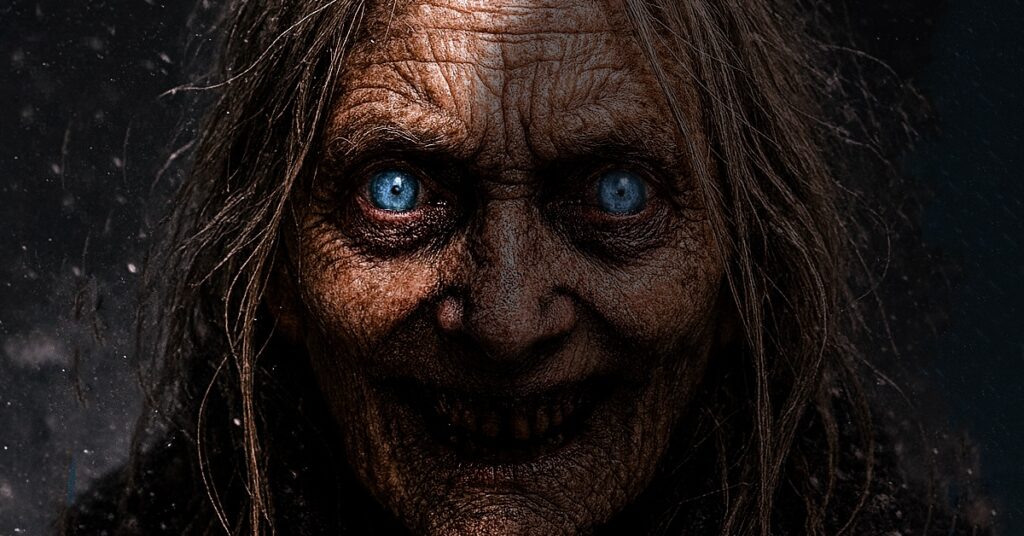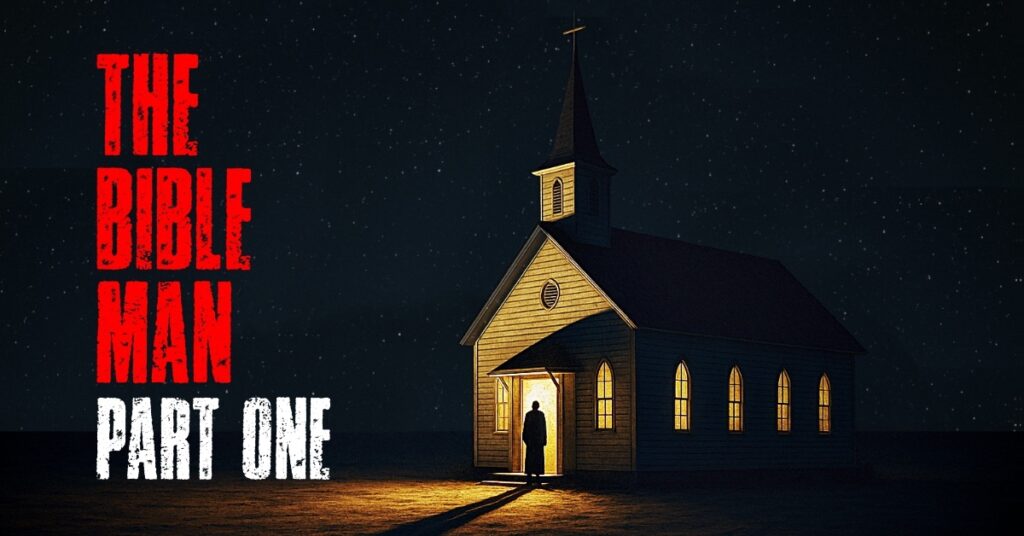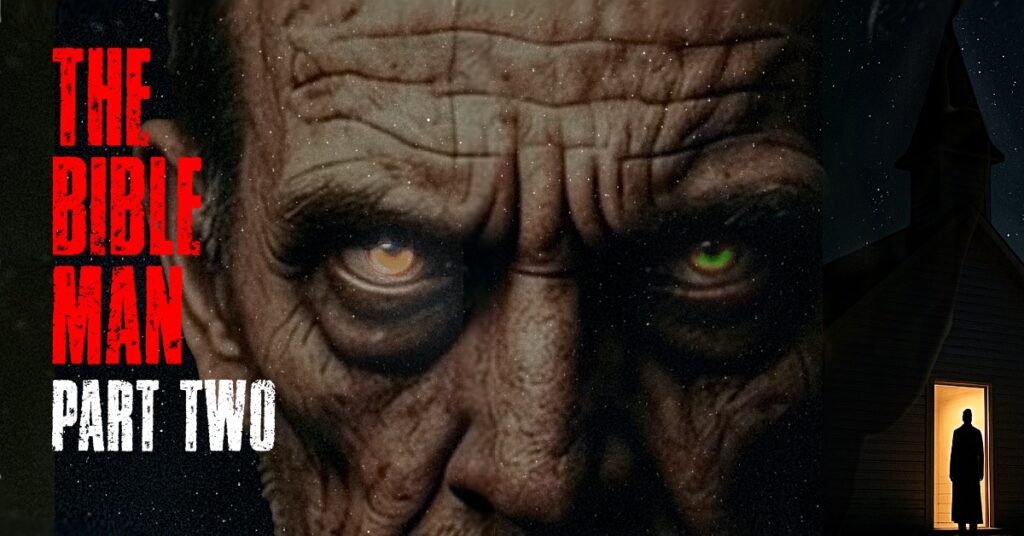Part I – What the Blizzard Carries 🩸
Jacob almost didn’t go to class that night. The snow outside was falling in angry sheets, the kind that blurred streetlights into pale smears and made the road look like a white, endless belt unspooling forever. Clair Town never canceled anything though. Not classes, not buses, not parades—snow or shine, it always trudged forward. It had that small-city complex, always looking toward Chicago like a younger sibling desperate to prove itself. Jacob’s parents had muttered about him staying home, but in the end, he’d shrugged, slung his backpack over his shoulder, and gone.
By the time Jacob boarded the subway home after his evening class, he was already regretting the decision to come out at all. It was late, the storm had worsened, and the station felt deserted—eerily hollow. His breath hung in the air like fog, drifting up toward the buzzing fluorescent lights. When the train finally dragged itself into the platform with mostly empty carriages, he stepped into one and realized, with a prickling unease, that he was completely alone. The lights inside flickered faintly overhead. His shoes squeaked on the linoleum as he crossed the aisle, every sound magnified. The only noise beyond his own movements was the electric hum of the heating unit, a tired beast grinding against the cold that pressed in from the storm.
He slid into a seat, phone in hand, and the doors hissed shut.
The train lurched forward, and for the first few stops, it was just him and the silence. His reflection looked back at him in the black glass of the window, pale and stretched. Then, sometime after the seventh stop—he didn’t even notice her arrive—she was there.
The bag lady.
She sat at the far end of the car, hunched under the fluorescent lights that seemed to show too much of her. Her face was a geography of wrinkles and shadow, her eyes a startling blue, pale and cracked like lake ice. She was chewing something—seeds maybe, or a granola bar—but her mouth moved with a wet, grinding noise, and every so often she spat a husk onto the dirty floor. Her teeth—what was left of them—were brown stumps. White hair clung to her scalp in stringy bunches. Beside her were bags, heaps of them, collapsing in on themselves, reeking faintly of rot and mildew.
She stared at him as she chewed.
Jacob tried to look away, but the car’s long windows reflected her just as easily as they reflected him. Whenever he glanced up, he caught those frozen eyes fixed on him.
The subway car lurched forward, its walls layered with scars of old ink and marker. Just above his seat, a heart sagged with grime, the names Scotty + Andrew scrawled inside it like a half-forgotten vow. Beneath it, in sharp black letters, another hand had left its mark: Fuck Fudgepacking Fags, the words stretched and spidery, crawling across the panel like cracks in plaster. Farther down, sprayed in crude strokes that dripped against the metal, a crooked swastika slanted beneath the blunt declaration: Hitler was right.
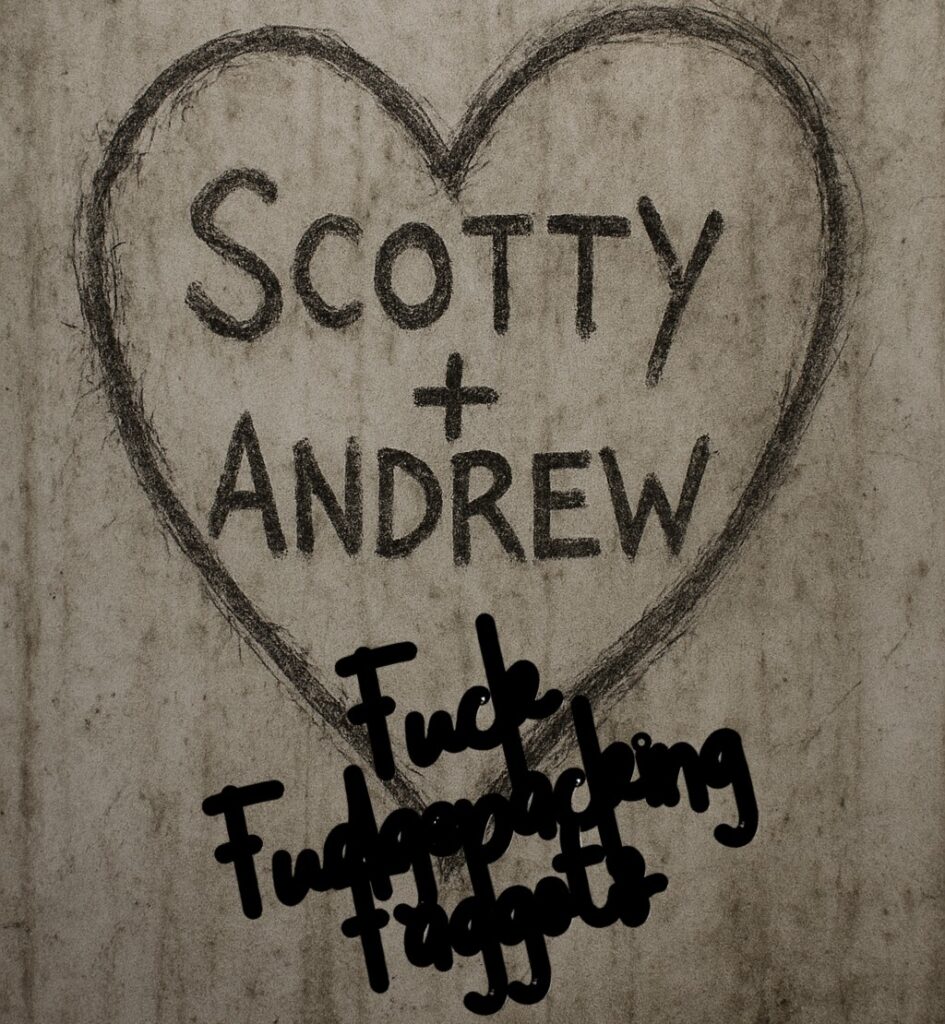
The words slid by like a parade of scrawled malice, and Jacob felt the old woman’s eyes bore into him the entire time. Her chewing grew louder, impossibly loud, as if her molars were grinding right beside his ear.
By the time the train slowed near the end of the line, an announcement clicked on.
“Attention passengers,” the voice was calm, even chipper. “Due to the severe snowstorm, service will terminate tonight at the last stop of Ashburne Station. Trains will not return downtown. Please exit upon arrival.”
Jacob blinked. Ashburne. That was one stop short of St. Clair, where he usually switched to the bus. He gathered his things quickly, ready to rush for the bus loop before everything shut down.
Jacob hurried out as the doors hissed open, boots slapping the platform tile. The station air was colder, rawer, and he tugged his coat tight. Instinct made him glance back before heading up the stairs, just one quick look over his shoulder into the car he’d just left.
And there she was.
The bag lady hadn’t moved an inch. She sat enthroned at the far end, bags piled high around her, the seat cradling her like a grotesque altar. The fluorescent lights inside the car made her skin look almost waxen, folds upon folds sliding down her cheeks, a face not aged so much as eroded by time. Her hair was brittle, white, pulled back in a greasy nest, and those eyes—those pale, dead-lake eyes—glared out through the glass, unblinking, pinning him where he stood.
Her mouth was still working faintly, jaws grinding with a wet crunch as she gnawed on something unseen, strands of saliva catching the light when she shifted. Behind her lips, the stubs of her teeth were pitch-black, charred-looking, as though fire itself had chewed them down. It was a face that didn’t belong here, not in this century, not in this city. It belonged in some famine portrait, some yellowed photograph found in an attic trunk, some nightmare whispered about in a language no one speaks anymore.
Jacob froze, guilt curling sharp in his gut. Why wasn’t she getting off? The announcement had been clear—Ashburne was the final stop. Every train in the city was halting here tonight. Was she so old she didn’t understand? Was she too weak to move? For a moment, he felt the urge to go back, to gesture, to ask if she needed help.
But then she blinked—just once—and it was like watching a corpse remember how to mimic the living. The suddenness of it made his stomach lurch. The compassion drained as quickly as it had come. No. He wasn’t going back.
She sat still, locked in her place, staring through the glass at him with that awful, skeletal patience. The doors closed, sealing her in, and as the train hummed back into silence, Jacob realized he was standing alone on the platform, shivering, with her eyes still burning into him from the window.
Part II – Shadows That Follow
The stairs leading to the bus bay were slick with melted snow, the yellow paint on the steps almost worn away. He burst into the night just as a lone bus was growling to life. He dashed for it, slapped his transfer against the scanner, and collapsed into a seat.
“Storm’s shutting the city down,” the driver grumbled as Jacob stepped in. “Not many runs left after this one.”
The driver hadn’t been lying—Jacob was the only passenger when he climbed aboard. He slid into a seat midway down, shaking the snow from his coat, chest heaving from the sprint across the platform. For the first time that night, relief brushed over him. The storm was still clawing at the windows, but inside it was warm, the steady growl of the heater humming through the cabin. He let his head rest against the glass, watching the blizzard churn past the sodium-lit suburbs.
The bus lurched forward. The tires groaned as they clawed over ice-crusted streets, the windshield wipers beating a desperate rhythm against the storm. He thought of his parents’ house—his mother probably worrying aloud, his father pacing. He even thought of his little brother, likely up too late with his video games, headphones clamped tight. The idea of walking through the front door, thawing by the kitchen radiator, almost lulled him into calm.
But then the sound began.
Crunch. Crunch. Crunch.
At first he thought it was part of the storm, ice cracking under the weight of tires, or maybe his imagination filling the silence. But no—it was too steady, too deliberate. He froze, heart ticking louder in his chest.
The sound sharpened. Louder. Not snow. Wet. Organic. Chewing.
A shiver snaked down his spine. He turned slowly, every instinct screaming not to.
And there she was again.
At the very back of the bus, half-buried in shadows, sat the bag lady. The same seat she had taken on the train, as if she had never left it, as if she had folded space and simply… appeared. Her mountain of rags and plastic bags slouched around her, her long fingers rooting in the depths of one as if plucking invisible seeds. Her jaw moved ceaselessly, crunching, smacking, the sound carrying through the empty cabin like teeth gnawing close to his ear.
And with her—came the cold.
It started as a faint draft brushing across his ankles, impossible in a sealed bus. Then it grew, a creeping chill that rolled up his legs, through his chest, until the hair on his arms lifted under his coat. The heater’s steady growl sputtered, choked, as if strangled, and suddenly the air inside felt as raw and biting as the storm outside. Wind hissed along the windows, rattling them in their frames, snowflakes stinging his face though the glass remained closed. The storm had followed her in.
She raised her head.
Her eyes met his.
Blue. Not the blue of sky or water, but of something frozen solid, something dead and preserved under ice for centuries. Her stare held him pinned. The chewing never stopped.
Jacob’s throat clenched. He wanted to speak, to shout for the driver, to demand an explanation for how the hell she’d gotten here when he’d seen her still sitting on the train. But nothing came out. His voice was gone, the storm devouring him in white noise.
The bus rolled on, groaning and swaying, the windows trembling as gusts battered its frame. It felt less like a commute and more like a coffin being dragged through a tunnel of white noise. Every second stretched. Every glance back showed her in the same place, the same motion—chewing, staring, watching.
By the time the bus wheezed into his stop, Jacob was trembling. He stumbled down the steps into the storm, the cold hitting him like a slap. He turned instinctively for one last look.
She hadn’t moved. She was still there, jaw working, lips wet, her pale eyes fixed on him through the fogged glass.
The bus roared off into the storm, carrying her away, but the image stuck in Jacob’s skull like frostbite.
The snow had thickened into a blindfold. The wind was a knife, slicing across his cheeks, forcing his eyes into narrow slits. He hunched into his coat, breath steaming in quick bursts, and began the long trudge through the neighborhood toward home. Each block stretched into an eternity. The storm roared around him, but underneath the howl of the wind came something else.
At first it was faint—so faint he thought it might have been his imagination.
Crunch.
Far behind him. Then again, steady, deliberate.
Crunch. Crunch.
Footsteps.
He froze mid-step, the snow swirling thickly under the orange glow of a streetlamp. His own breathing thundered in his ears. Slowly, he turned, squinting into the blur of storm.
A figure.
Far back, trudging along the same path, bent under the weight of sagging bags that swung from her shoulders. White hair whipping across her face. The silhouette was unmistakable.
No.
No, no, no.
He had seen her last—still sitting on the bus. It wasn’t possible. She couldn’t be here. Not like this.
Jacob’s pulse spiked. He turned forward and began to walk faster, his boots hammering down into the drifts. His breath came in harsh gasps, fogging in the frozen air. Around him the neighborhood seemed deserted, lifeless.
The homes lining the street loomed in silence, their snow-slicked roofs glowing faintly in the storm. Strings of Christmas lights still burned, but their cheer felt wrong—twinkling reds and greens bleeding into the swirling white, electric reindeer standing sentinel in front yards, their glassy eyes filled with ice. Inside the houses, windows glowed warm with lamplight, glimpses of trees glittering with ornaments, but not a sound escaped, not a voice, not a laugh. It was as though the suburb had been frozen mid-breath, waiting.
Behind him, the footsteps grew louder.
Crunch. Crunch. Crunch.
He risked a glance back. The figure was closer now, the outline sharper. Shoulders hunched, head bowed, but even from this distance he could feel her stare crawling across his spine.
Jacob’s walk turned into a hurried stride. His arms pumped stiffly, boots striking harder, faster. The storm seemed to deepen with every step, the wind clawing, the snow rising against his legs. His panic pressed him almost to a run.
But the sound followed.
Crunch. Crunch. Crunch.
Closer.
Too close.
His chest burned, lungs screaming for air. He staggered, forced himself forward. But no matter how fast he went, the rhythm behind him matched his own, closing the gap, relentless.
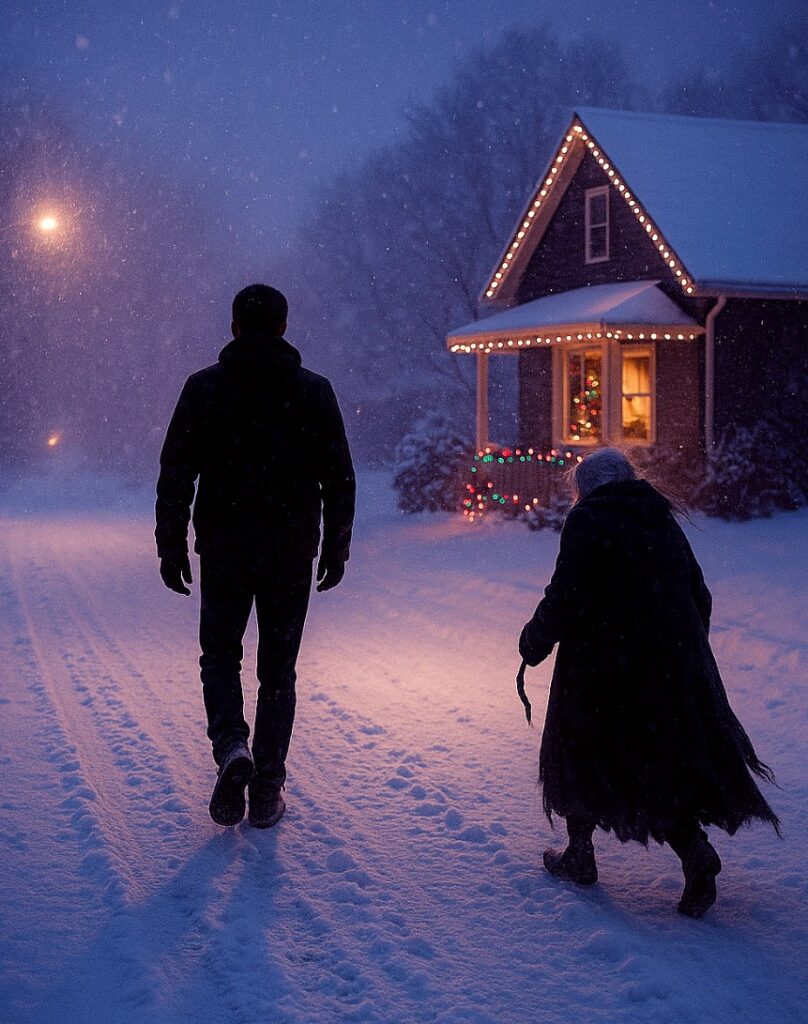
Finally he snapped. He couldn’t take it—the not-knowing, the stalk of those steps inching closer with every block. He spun around, his heart slamming against his ribs—
And she was there.
Not far back. Not yards away. Right there. Inches from his face.
The storm seemed to vanish in that instant, muffled, muted, as though the world had folded inward. He could see every line in her skin, deep furrows carved as if by centuries, not years. Her eyes were ice—blue and cracked, like frozen glass that would never thaw. Her mouth worked slowly, lips glistening with spit, blackened stumps of teeth gnashing together with a stink of rot and damp earth.
The face wasn’t just old. It was ancient, pulled forward from another time, another plague-stricken century, a ghost of famine and pestilence given form. She belonged in the faded photograph of a mass grave, not in the living world.
Jacob felt his legs falter. His body locked. Her breath seeped into him, sour and cold. His scream caught in his throat and died there. The longer he stared, the weaker he felt, as though her gaze was drawing him down, down, into a trance, into some black pit that smelled of rot and dust.
The wind shrieked. The snow clawed at his skin. His mind reeled.
And then—
Nothing.
But not nothing.
Through the veil of storm, through the blur of white and ice, he saw her rise.
Part III – The Mouth of the Storm
The bags that had always sagged from her shoulders fell away, scattering across the snow like molted skin. Her hunched back straightened, stretching taller, impossibly tall, until she seemed to tower above the rooftops. The rags that clung to her body whipped in the wind, flaring out in sheets of black and gray that curled and spiraled like living smoke. Her hair, no longer stringy, fanned out in a white halo, strands floating upward as if the storm itself were holding her aloft.
She levitated, her feet leaving no imprint on the earth. The storm bent toward her, drawn in, snowflakes swirling into her shape, into her outline, until she was no longer merely a woman but something larger — a phantom sculpted from winter itself.
Jacob’s eyes locked on hers, and though her face was still ancient, still carved in centuries of ruin, there was a dreadful magnificence now. Her cracked lips parted, and the chewing sound stopped. For the first time, he saw her still, silent, statuesque — a terrible queen presiding over the blizzard.
The snow and wind circled her like worshippers. Her arms lifted, long and skeletal, and the rags fluttered around her like wings. With each movement, the night bent — streetlamps flickered, windows shuddered in their frames, the world itself seemed to bow.
Jacob felt his body stiffen, every muscle gone rigid. He couldn’t breathe. His heart pounded once, twice, then slowed, as if her gaze had reached into his chest and taken hold. The longer he stared, the weaker he felt. Her eyes glowed now — not just blue, but radiant, crystalline, as if frozen stars had lodged inside them.
The storm roared, the wind screamed, and she hovered above him, magnificent, inhuman, eternal.
His knees buckled. Darkness flooded his vision, pulling him down, drowning him in ice and wind.
And then—
He opened his eyes to darkness. His head throbbed. He was standing in his house. How had he gotten here? His boots left puddles of melted snow on the tile. His ears buzzed with a low, mechanical hum.
Whup. Whup. Whup.
The sound reached him first — a low, steady whupping that echoed faintly through the house, like a heartbeat muffled by walls.
The ceiling fan.
But it was winter. The fan never ran in winter.
Jacob frowned, every nerve on edge. The noise wasn’t coming from above him, but from deeper in the house. Down the hall. Past the shadows.
He hesitated, then stepped forward. His boots left wet prints on the tile, squeaking faintly with each movement. The corridor stretched before him, dark, narrow, seeming longer than it had any right to be. The sound grew clearer as he moved, the fan’s blades chopping the air in uneven rhythms, a steady whup-whup-whup that carried an edge of violence, as though the air itself were being torn apart.
The further he walked, the louder it became, vibrating in his chest, shaking loose in his teeth. It no longer sounded like a fan at all, but like something mechanical trying to imitate one, failing, its rhythm jagged and wrong.
The hum pulled him forward, each step heavier, until he reached the doorway. Then the smell struck—thick, metallic, sour—iron and shit, meat left out in August heat. It crawled into his nostrils, coated his tongue, and his stomach heaved before his eyes even lifted to see what waited inside.
He stepped into the living room.
The fan blades spun, creaking as if straining under a load. Hanging from one by a twisted wire hanger was the family cat. Its limp body swung with each rotation, one eye socket threaded through the hook, the empty hole staring like a dark coin. Tufts of fur caught in the blades fluttered down in slow motion, snowing over the carpet. The cat’s tail dragged trails of blood as it spun, its claws curled in rigor mortis, mouth fixed in a silent hiss.
Jacob staggered, bile rising. Then his eyes dropped lower.
His father was propped upright in the recliner, but he was no longer whole. His head lolled at a sick angle, the entire bottom half of his jaw gone, torn away. Teeth and fragments of bone littered the carpet around his feet like spilled dice. His tongue hung down, a shredded strip of meat. The shirt he had worn was soaked black, chest punctured over and over as though something had stabbed and stabbed long after he was already dead. His eyes, still open, glimmered in the lamplight, glassy with terror.
On the couch, his mother lay splayed open like a grotesque autopsy. Her chest cavity was empty, ribs cracked apart, peeled outward like wings. Strips of tissue dangled from the jagged edges, her organs smeared across the wall in crimson handprints that dripped slowly, marking time. Her face had been ripped half away, her jaw clenched around nothing.
Near the TV, his little brother’s head sat upright on the carpet, eyes staring blankly, mouth frozen in a scream. His body had been crumpled beside it, arms bent backwards at impossible angles, ribs jutting against his thin shirt. The boy’s skin was paper-white, veins visible like blue cracks in porcelain. The blood pooled thick and almost black, soaking the rug beneath him.
The room looked pillaged—drawers ripped from cabinets, the coffee table overturned, shards of glass everywhere. Jewelry boxes smashed, the TV half-pulled from the wall. A robbery, Jacob thought wildly, but no… not just robbery. Too violent. Too personal. This was slaughter.
He gagged, clutching the wall as his knees buckled. His breath came ragged, loud in the dead silence. The only sound was the fan whupping overhead, spinning the ruined cat in lazy circles.
And then—he felt it. A shift. A presence that he now knew all too well.
His skin prickled before he turned.
When he did, her face was inches from his.
The bag lady.
Those cracked blue eyes burned into his, unblinking, glacial. Her mouth glistened with saliva, lips peeling back to show those rotted stumps of teeth, black and splintered, grinding together. Her breath hit his cheek—sour, damp, like gravesoil dragged up from the earth. Then her tongue slid out, gray and slick, flicking like a serpent’s before coiling back on itself, as if tasting the fear that clung to him.
“Windwalker,” she hissed, the word tearing out like a curse, like a verdict.
Jacob’s body went cold. His legs refused to move.
The lights above flickered, shadows jittering across the gore-stained walls. The fan whupped faster, the cat’s limp body spinning wildly. The word echoed in his skull, again and again—Windwalker, Windwalker, Windwalker—chewing through him the way her teeth chewed through seeds.
And then there was nothing but her—her eyes, her breath, her presence filling every corner of the room. The storm outside bent itself to her rhythm, every howl rising and falling as if she commanded it.
Jacob’s gaze drifted, against his will, to the walls.
The blood wasn’t only splattered in frenzied handprints. It had been shaped—deliberately smeared into letters, long strokes and crooked lines that glistened black in the flickering light. His stomach lurched as the words took shape before his eyes.
YOU WERE LAST.
The letters sprawled across the wallpaper, written in his mother’s blood, maybe his father’s, maybe his brother’s—it didn’t matter. It was a message. A verdict.
Jacob’s knees buckled. His throat closed.
In that moment he understood: she hadn’t come to kill. She hadn’t needed to. Death had already arrived, faceless and ravenous, through robbery or madness or something darker still. The Windwalker only followed. She was the echo, the carrion bird, the ancient herald crawling from century to century, bearing witness. She came to announce death, to sanctify it with terror, to feed on what it left behind.
And then she leaned closer.
Her mouth pressed to his, impossibly wide, inhumanly cold. She inhaled, and the air inside him fled. His lungs collapsed, ribs caving inward with a sick crack, vision darkening as if his very soul were being pulled through his throat. His body convulsed, starved of oxygen, every nerve on fire with pain.
She released him, eyes glowing, and exhaled his stolen breath into the storm. The windows rattled as the blizzard roared in reply.
Jacob clawed at his chest, drowning on dry land. The pain was unbearable, every gasp emptier than the last. His gaze landed on the shard of broken glass glittering in the dark beside his brother’s head. His hand trembled toward it. Not her will now. His.
He couldn’t endure it. He couldn’t bear the suffocating agony another second. Better to end it. Better to go where the rest of them had gone.
His fingers closed around the shard. The point pressed to his sternum. One last, desperate choice.
The Windwalker did not strike. She only watched.
With a hoarse cry that never became a scream, Jacob drove the glass inward. His body jerked, then stilled. The storm swallowed the moment whole.
The lights flared once, twice—then died.
And then there was nothing—nothing but the message dripping on the wall, and the storm outside, howling.
© 2025 Bernard Kradjian. All rights reserved. This story is the property of its author and may not be reproduced, distributed, or used in any form without prior written permission.

